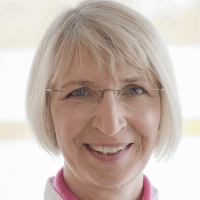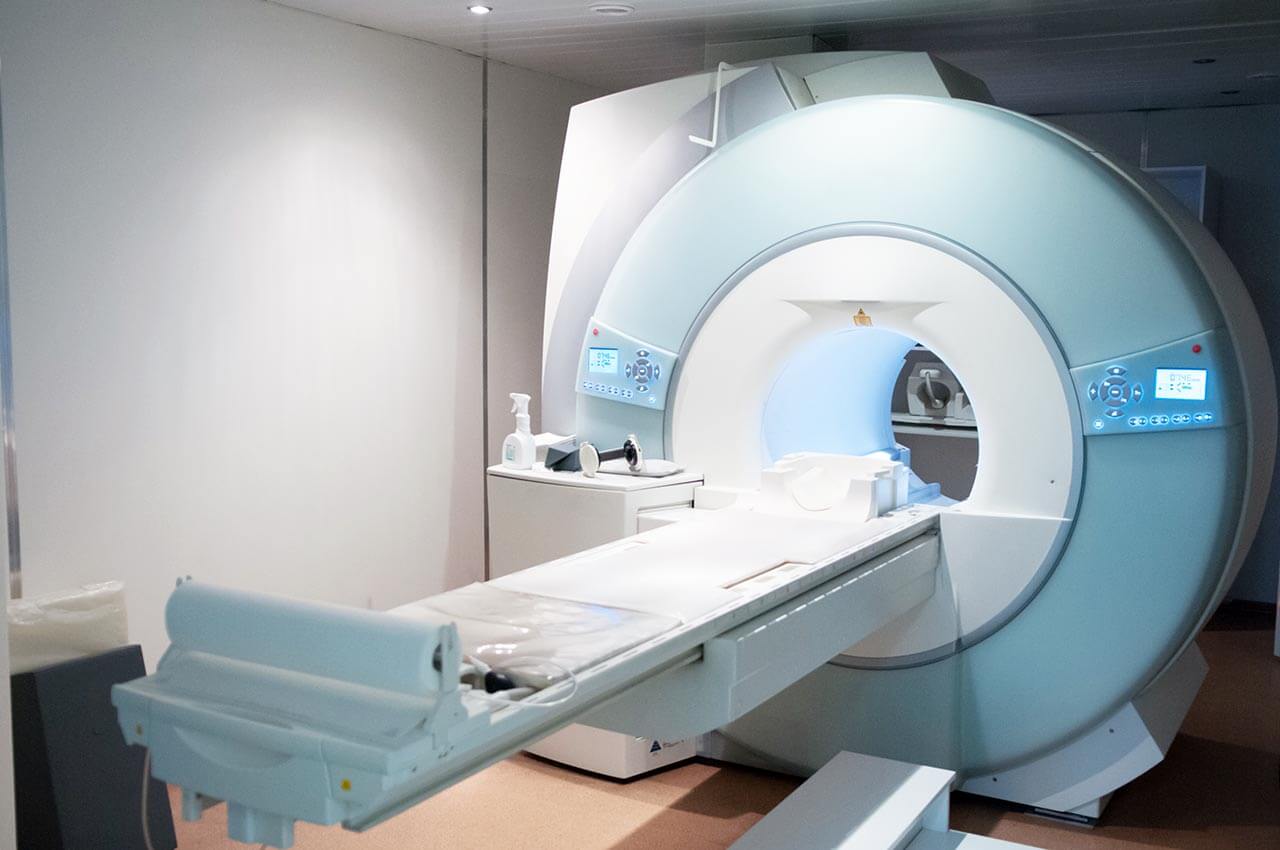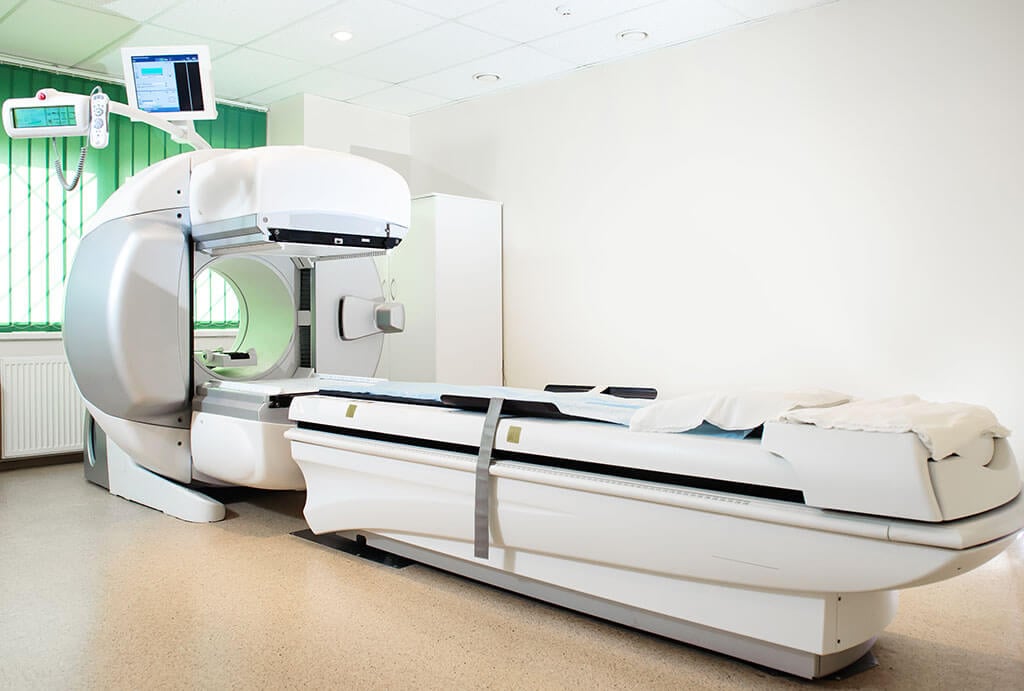
The program includes:
- Initial presentation in the clinic
- clinical history taking
(widespread pain for more than three months) - review of medical records
- physical examination
- laboratory tests:
- complete blood count
- general urine analysis
- biochemical analysis of blood
- TSH-basal, fT3, fT4
- immune status
- inflammation indicators (CRP, ESR)
- indicators blood coagulation
- differential diagnosis with other etiologies pain
- pain points testing
- consultation of related specialists
- symptomatic specific treatment
- the cost of essential medicines and materials
- nursing services
- control examinations
- full hospital accommodation
- developing of further guidance
Required documents
- Medical records
Service
You may also book:
 BookingHealth Price from:
BookingHealth Price from:
About the department
The Department of Rheumatology at the DKD HELIOS Clinic Wiesbaden offers the full range of diagnostic and therapeutic services in the area of its specialization. The highly qualified doctors of the medical facility provide effective treatment of inflammatory and degenerative rheumatic diseases, musculoskeletal pathologies caused by such metabolic disorders as osteoporosis, gout, diabetes mellitus, as well as soft tissue rheumatism. Of particular interest is the treatment of systemic inflammatory rheumatic diseases. The diagnostics is carried out using modern laboratory tests and imaging methods. The department's rheumatologists cooperate with highly qualified specialists from the related medical fields. Such an approach allows them to develop optimal treatment regimens and achieve successful results. The therapeutic process is based on the intake of innovative drugs, including biological ones. Each treatment regimen is unique and adapted to the individual clinical indications of the patient. The Chief Physician of the department is Dr. med. Sabine Gansauge.
The most common disease in the clinical practice of the specialists working in the medical facility is rheumatoid arthritis. The disease affects the connective tissues and leads to the destruction of the joints. Rheumatoid arthritis usually begins with vague symptoms: the patient feels fatigue and weakness, complains of joint stiffness, and if untreated, he also develops fever and muscle pain. The diagnostics of pathology is quite problematic, since the symptoms of rheumatoid arthritis are similar to the manifestations of a number of other diseases, for example, gout and osteoarthritis. To make an accurate diagnosis, the department's doctors carry out a clinical examination, study the patient's medical history, appoint the required laboratory tests, ultrasound examinations and computed tomography. The classic treatment protocols are based on drug therapy to relieve pain and improve joint mobility. The department's specialists individually prescribe the required complex of drugs, including nonsteroidal anti-inflammatory drugs, basic and biological drugs. In case of severe joint lesions, surgical treatment may be required. The operation is performed in cooperation with specialized surgeons.
The department's specialists often admit patients with systemic lupus erythematosus. Pathology is a severe chronic autoimmune disease, in which the immune system begins to produce antibodies against the body's own cells, thereby destroying them. In case of suspected systemic lupus erythematosus, a dermatologist is involved in the diagnostic process as well, since the main visual manifestations of the pathology are associated with the skin – the patient develops a rash on his cheeks and nasal bridge, the body becomes covered with large red spots, nail brittleness increases, and in advanced cases the patient may have trophic ulcers on the skin. Since systemic lupus erythematosus cannot be completely cured, the treatment consists of supportive care to relieve symptoms and aims to provide a decent quality of life. To achieve these goals, the department's doctors individually select the most effective drugs. In most cases, cytostatics, glucocorticosteroids, nonsteroidal anti-inflammatory drugs and biological drugs are used.
The department's range of medical services includes:
- Diagnostics and treatment of inflammatory rheumatic diseases
- Diagnostics and treatment of inflammatory joint diseases (for example, rheumatoid arthritis)
- Diagnostics and treatment of inflammatory spinal diseases (for example, ankylosing spondylitis)
- Diagnostics and treatment of connective tissue diseases (for example, undifferentiated collagenosis, systemic lupus erythematosus, scleroderma, dermatomyositis, mixed connective tissue disease)
- Diagnostics and treatment of vasculitides (for example, polymyalgia rheumatica, ANCA-associated vasculitis)
- Diagnostics and treatment of degenerative changes in the spine and large joints
- Diagnostics and treatment of musculoskeletal diseases caused by metabolic disorders (for example, in osteoporosis, gout, diabetes mellitus)
- Diagnostics and treatment of other diseases
Curriculum vitae
Higher Education and Postgraduate Training
- 1980 - 1987 Study of Human Medicine, Hannover Medical School, University of Wales College of Medicine, Cardiff.
- 1990 Doctoral thesis defense. Subject: "Assessment of the course and severity of the disease on the example of the initial stage of chronic polyarthritis."
- 1995 Board Certification in Internal Medicine.
- 1996 Specialization in Rheumatology.
- 1998 Additional qualification in Physiotherapy.
Professional Career
- 1987 Assistant Physician, Department of Internal Medicine, Clinic Weser, Hameln.
- 1988 - 1994 Research Fellow, Department of Internal Medicine V, University of Heidelberg (main specializations: Hematology, Oncology, Rheumatology).
- 1995 Acting Head of the Department, Hospital Bad Kreuznach.
- 1995 - 2002 Senior Physician, Department of Rheumatology, Catholic Hospital Mainz.
- Since 2002 Head of the Department of Rheumatology at the DKD HELIOS Clinic Wiesbaden.
Clinical Interests
- Rheumatoid arthritis.
- Spondyloarthropathy.
- Collagenoses.
- Vasculitides.
- Soft tissue rheumatic lesions.
- Fibromyalgia
- Degenerative joint diseases.
Photo of the doctor: (c) DKD Helios Klinik Wiesbaden
About hospital
The DKD HELIOS Clinic Wiesbaden has long made a name for itself in the international medical arena by introducing an optimal model of medical care, combining the use of the most advanced medical technologies, the experience of highly qualified doctors and impeccable quality of patient care. The medical facility first opened its doors to patients in 1970. The world famous Mayo Clinic Rochester in America served as a model for the design of the medical complex. Since the foundation of the clinic, the main direction of its activities has been comprehensive diagnostics of complex diseases integrated into an interdisciplinary treatment concept. Today, an integral part of clinical practice is also preventive diagnostics aimed at the early detection of pathological changes in the human body. In recent years, the clinic has been actively developing the direction of surgery, in which it has significantly succeeded. The clinic enjoys a reputation as one of the best medical facilities in Europe in the field of endocrine and colorectal surgery, as well as in hernia repair surgery.
The clinic has 24 specialized departments. Each of them offers a team of experienced doctors, whose main value is the patient's health. The work of all doctors of the medical facility is based on a single credo – "Treat not a disease, but a patient". According to this belief, the course of treatment should be as individual as possible, taking into account the patient's physical characteristics, lifestyle, diet, emotional state, etc.
The clinic's bed capacity consists of 138 inpatient beds and 60 beds in a day hospital. Many diagnostic and therapeutic procedures are performed on an outpatient basis. The diagnostic and treatment rooms, like the operating rooms of the clinic, are equipped with state-of-the-art technology to ensure the observance of strict hygiene and safety standards. The advanced medical equipment allows detecting the slightest changes in the functioning of organs and their structure with impeccable accuracy, thanks to which doctors can diagnose complex pathologies at the very early stages. This greatly increases the chances of a successful cure.
The location of the clinic in Wiesbaden, known as one of the oldest thermal spas in Europe, is another pleasant advantage for the patients. Arriving at the clinic for a preventive diagnostic examination, one can improve his health in the healing thermal springs, as well as enjoy the sightseeing of historical monuments. The medical center is located in the immediate vicinity of the English style Spa Park founded in the distant 1852, so in the free time from medical procedures one can take a pleasant walk in the beautiful park.
Photo: (с) depositphotos
Accommodation in hospital
Patients rooms
The patients of the DKD HELIOS Clinic Wiesbaden live in comfortable single and double rooms. Each patient room has an ensuite bathroom with shower and toilet. The standard patient room furnishings include an automatically adjustable bed, a bedside table, a table and chairs, a TV and a telephone.
The clinic also offers enhanced comfort rooms with spacious bathrooms, which additionally include a large mirror, hairdryer, changeable towels and toiletries. These patient rooms also have a safe for storing valuables, a free minibar with soft drinks, a flat-screen TV with satellite channels and free Wi-Fi.
Meals and Menus
The patients of the clinic are offered tasty and balanced three meals a day: breakfast, lunch and dinner. If for some reason you do not eat all the foods, you will be offered an individual menu. Please inform the medical staff about your dietary preferences prior to treatment.
The clinic also has a cozy cafe where one can taste delicious snacks, salads, main courses and desserts. One can also enjoy aromatic coffee, delicious tea and soft drinks in the cafe.
Further details
Standard rooms include:
Religion
The religious services are available upon request.
Accompanying person
During the inpatient program, the accompanying person can live with the patient in a patient room or a hotel of his choice. Our managers will help you choose the most suitable option.
Hotel
During the outpatient program, the patient can stay at the hotel of his choice. Our managers will help you choose the most suitable option.





